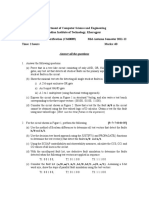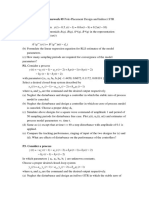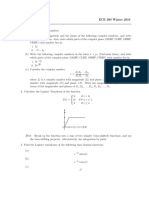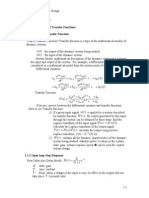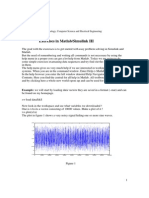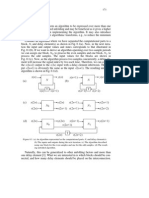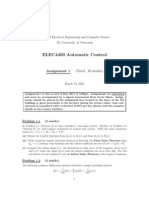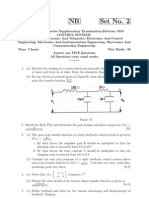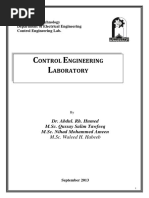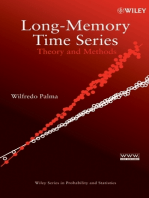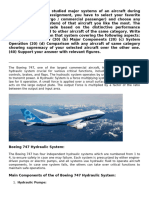Recursive Least Square
Recursive Least Square
Uploaded by
Zinaida LatićCopyright:
Available Formats
Recursive Least Square
Recursive Least Square
Uploaded by
Zinaida LatićOriginal Description:
Copyright
Available Formats
Share this document
Did you find this document useful?
Is this content inappropriate?
Copyright:
Available Formats
Recursive Least Square
Recursive Least Square
Uploaded by
Zinaida LatićCopyright:
Available Formats
1.
Real process with transfer function:
1
G0 ( s ) .
( s 0.5 s 1)
2
Generate input and output of process in time 0 t 100 s , with step T=0.1 [s], for three different
cases:
a) Step signal
b) White noise signal which takes values from 0 to 2.
c) Output of filter which transfer fcn is
1
G f ( s) , if input is signal from b.
0.1s 1
2. Input and output signals from 1 show graphicly.
3. Using RLS and data generated in 1a,1b,1c estimate values of process model.
a) RLS start on two different ways.
a1) RLS starts without any informations about parametars
a2) RLS starts in t=10 [s], depending on LS estimation until t=10 [s].
b) Graphicly show estipation of parametars in time 0 t 100 s .
c) Graphicly show error between real process and estimated values on output of process in time
0 t 100 s .
d) Compare results.
4. Real process with transfer fcn:
1
G0 ( s ) .
s( s 0.5 s 1)
2
Do all steps like in 1,2 and 3.
5. For the analysis of process modeling in the conditions of measurement interference (or
inaccuracy of measurement) assume the situation as in Fig.1. where e (t) denotes the measurement
interference. e(t)
u(t) z(t) + y(t)
PROCES +
Sl.1.
6. Perform the procedure as in 1, but the measurement error e (t) is a pseudorandom signal with a zero
average value and takes values in the range of -0.02 to 0.02.
7. Signals u(t), y(t) i e(t) for case from 5. Show graphicly
8. Using RLS and data generated 5 estimate values of process model.
e) RLS start on two different ways.
a1) RLS starts without any informations about parametars
a2) RLS starts in t=10 [s], depending on LS estimation until t=10 [s].
f) Graphicly show estipation of parametars in time 0 t 100 s .
g) Graphicly show error between real process and estimated values on output of process in time
0 t 100 s .
h) Compare results.
9. Compare results from 3 and 7.
You might also like
- Solutions To Exercises On Processes SynchronizationDocument5 pagesSolutions To Exercises On Processes SynchronizationLộc Sẹo100% (1)
- Problem 2Document4 pagesProblem 2Jade Do0% (1)
- 2015 2016 - L 4 - T 1 - CheDocument52 pages2015 2016 - L 4 - T 1 - CheBiplab SarkerNo ratings yet
- 2015-2016 (L-4, T-1) - Che PDFDocument52 pages2015-2016 (L-4, T-1) - Che PDFMahmud Rahman BizoyNo ratings yet
- Data-Based Approach To Feedback-Feedforward Controller Design From Closed-Loop Plant DataDocument6 pagesData-Based Approach To Feedback-Feedforward Controller Design From Closed-Loop Plant DataArif HidayatNo ratings yet
- LAB MANUAL_SIGNALS & SYSTEM_EC244AI_May_24Document53 pagesLAB MANUAL_SIGNALS & SYSTEM_EC244AI_May_24hellouniversx1No ratings yet
- Introduction To LTI Representation and Transfer FunctionDocument26 pagesIntroduction To LTI Representation and Transfer FunctionNoel Lorenzo PagatpatNo ratings yet
- State Errors - Steady: Eman Ahmad KhalafDocument28 pagesState Errors - Steady: Eman Ahmad KhalafAhmed Mohammed khalfNo ratings yet
- Design of The Deadbeat Controller With Limited Output: L. Balasevicius, G. DervinisDocument4 pagesDesign of The Deadbeat Controller With Limited Output: L. Balasevicius, G. DervinismailmadoNo ratings yet
- MATLAB ProblemsDocument4 pagesMATLAB ProblemsPriyanka TiwariNo ratings yet
- Msem 2011Document2 pagesMsem 2011Mani KandanNo ratings yet
- MatlabhintsDocument5 pagesMatlabhintsVeljkoNo ratings yet
- Problem As 5Document2 pagesProblem As 5turbodilanNo ratings yet
- Yt Yt Ut Ut: Adaptive Control Homework 05 Pole-Placement Design and Indirect STRDocument2 pagesYt Yt Ut Ut: Adaptive Control Homework 05 Pole-Placement Design and Indirect STRlaw0516No ratings yet
- Page 1 of 3Document3 pagesPage 1 of 3Thivanka RaviharaNo ratings yet
- Number System & CodesDocument29 pagesNumber System & CodesmafoxmentorshipNo ratings yet
- Coneng Exp5Document15 pagesConeng Exp5dumpyNo ratings yet
- Experiment 8 DC Motor Position Control SystemDocument15 pagesExperiment 8 DC Motor Position Control Systemprateek khotNo ratings yet
- 21EC44 - Expt -4Document18 pages21EC44 - Expt -4Harsh KumarNo ratings yet
- Final Exam-14122020Document2 pagesFinal Exam-14122020KRISHNA KOTI SAI PottupalliNo ratings yet
- Signal Classifications and Properties: Melissa Selik Richard Baraniuk Michael HaagDocument9 pagesSignal Classifications and Properties: Melissa Selik Richard Baraniuk Michael HaagvaavillsNo ratings yet
- Final ExamDocument2 pagesFinal ExamKRISHNA KOTI SAI PottupalliNo ratings yet
- Ege416 ProjectDocument6 pagesEge416 ProjectAddisu TsehayNo ratings yet
- Control System 2014 Midterm Exam. 1 (2 Pages, 38 Points in Total)Document7 pagesControl System 2014 Midterm Exam. 1 (2 Pages, 38 Points in Total)horace2005No ratings yet
- Assignment 1Document2 pagesAssignment 1Joe NguyenNo ratings yet
- CS ASS2 (13-17batch)Document3 pagesCS ASS2 (13-17batch)Anonymous yO7rcec6vuNo ratings yet
- 1 Point Questions: T S S SDocument2 pages1 Point Questions: T S S SKalambilYunusNo ratings yet
- AF 2 Repaso de Sistemas LTI ADocument8 pagesAF 2 Repaso de Sistemas LTI APedro BalderasNo ratings yet
- Midterm Answers: T T T 1 T T 2Document5 pagesMidterm Answers: T T T 1 T T 2blackbriar22No ratings yet
- PHET Free Fall LabDocument4 pagesPHET Free Fall Lableonardo.latinaidNo ratings yet
- DSP Lab Manual 2010Document53 pagesDSP Lab Manual 2010nullka0% (1)
- MIT6 004s09 Tutor20 Sol PDFDocument15 pagesMIT6 004s09 Tutor20 Sol PDFCHANDRA MOULI MARTHYNo ratings yet
- DGD 8 SolDocument6 pagesDGD 8 SolDolores MakaruinaNo ratings yet
- Assignment 3 SolutionDocument9 pagesAssignment 3 Solutionkaveendra.rcitNo ratings yet
- Identification: 2.1 Identification of Transfer Functions 2.1.1 Review of Transfer FunctionDocument29 pagesIdentification: 2.1 Identification of Transfer Functions 2.1.1 Review of Transfer FunctionSucheful LyNo ratings yet
- Lab No 08: Linear Control System 2016-EE-113Document7 pagesLab No 08: Linear Control System 2016-EE-113SaRosh RaeesNo ratings yet
- Taller Cuatro Análisis de SistemasDocument5 pagesTaller Cuatro Análisis de SistemasCarlosNo ratings yet
- Control Systems and Mechatronics ExamDocument4 pagesControl Systems and Mechatronics ExamOdoch HerbertNo ratings yet
- Lecture 2-Time-Shifted Signals and Matlab Implementation - SsDocument4 pagesLecture 2-Time-Shifted Signals and Matlab Implementation - SsOladimeji YusufNo ratings yet
- Chapter 8 HW Solution: (A) Position Vs Time. (B) Spatial PathDocument6 pagesChapter 8 HW Solution: (A) Position Vs Time. (B) Spatial Pathrosita61No ratings yet
- 1 Open Loop AnalysisDocument11 pages1 Open Loop AnalysisEngr Faisal Saleem JanjuaNo ratings yet
- Pci Mtech 2019Document6 pagesPci Mtech 2019Saif AliNo ratings yet
- ELEC4632 - Lab - 01 - 2022 v1Document13 pagesELEC4632 - Lab - 01 - 2022 v1wwwwwhfzzNo ratings yet
- Sos 2Document16 pagesSos 2youssef_dablizNo ratings yet
- 0.1 Unfolding: X (N) N y (N) X (n+1) N y (n+1)Document6 pages0.1 Unfolding: X (N) N y (N) X (n+1) N y (n+1)naras2No ratings yet
- Homework 3 SolutionDocument4 pagesHomework 3 SolutionJustin WinsletNo ratings yet
- Assignment 1Document4 pagesAssignment 1Michael AwaNo ratings yet
- Feedback Control Theory: A Computer System's PerspectiveDocument52 pagesFeedback Control Theory: A Computer System's PerspectiveAlberto Garcia CarrilloNo ratings yet
- IEEE Proof Web Version: A Hybrid Robust Non-Homogeneous Finite-Time DifferentiatorDocument7 pagesIEEE Proof Web Version: A Hybrid Robust Non-Homogeneous Finite-Time Differentiatorlibrian_30005821No ratings yet
- Resp 7Document44 pagesResp 7Joao VitorNo ratings yet
- March 2022Document2 pagesMarch 2022Narmada BheemaNo ratings yet
- Nr220405-Control SystemsDocument8 pagesNr220405-Control SystemsSRINIVASA RAO GANTANo ratings yet
- Lab 3 - Introduction To MATLAB: G(S) S (S + 1) (S + 2)Document3 pagesLab 3 - Introduction To MATLAB: G(S) S (S + 1) (S + 2)saharNo ratings yet
- Deadbeat Controller With Two Additional StepsDocument4 pagesDeadbeat Controller With Two Additional StepsASHOK KRNo ratings yet
- ControlDocument55 pagesControlHuyThaiNo ratings yet
- Lab2 Control SystemDocument43 pagesLab2 Control Systemعبدالملك جمالNo ratings yet
- Student Solutions Manual to Accompany Economic Dynamics in Discrete Time, second editionFrom EverandStudent Solutions Manual to Accompany Economic Dynamics in Discrete Time, second editionRating: 4.5 out of 5 stars4.5/5 (2)
- Log-Linear Models, Extensions, and ApplicationsFrom EverandLog-Linear Models, Extensions, and ApplicationsAleksandr AravkinNo ratings yet
- Fundamentals of Electronics 3: Discrete-time Signals and Systems, and Quantized Level SystemsFrom EverandFundamentals of Electronics 3: Discrete-time Signals and Systems, and Quantized Level SystemsNo ratings yet
- Hold Harmless Agreement TemplateDocument4 pagesHold Harmless Agreement Templatedrix100% (1)
- Non RMP Interview Programme I (AS) For The Month of October, 2023Document2 pagesNon RMP Interview Programme I (AS) For The Month of October, 2023qpal67666No ratings yet
- The Boeing 747Document8 pagesThe Boeing 747muqtadir0711No ratings yet
- Solovekia AhpDocument8 pagesSolovekia Ahpabbas6063No ratings yet
- Topics: Sets, Problem Solving, Statistics and Data ManagementDocument3 pagesTopics: Sets, Problem Solving, Statistics and Data ManagementPalliNo ratings yet
- Participatory Ext. MethodologyDocument27 pagesParticipatory Ext. MethodologyAleneNo ratings yet
- VOR NDB Numerical Test 1Document13 pagesVOR NDB Numerical Test 1sneha jauhariNo ratings yet
- Bill Ong Hing, Immigration Law Professor, Concerned That An Unreasonable Standard For Credible Fear Imposed On The DREAM 30Document8 pagesBill Ong Hing, Immigration Law Professor, Concerned That An Unreasonable Standard For Credible Fear Imposed On The DREAM 30DreamACTivistNo ratings yet
- Möller - Elecrostatic Precipitator - Multi-TTSDocument4 pagesMöller - Elecrostatic Precipitator - Multi-TTSAhmad NilNo ratings yet
- Smoke Movement in Atrium BuildingDocument9 pagesSmoke Movement in Atrium BuildingNguyễn Xuân ĐiệpNo ratings yet
- Dkte SyllabusDocument52 pagesDkte SyllabusDhiraj TelvekarNo ratings yet
- Kia Seltos (SP2i) PE Brochure-1 - 240717 - 080816Document4 pagesKia Seltos (SP2i) PE Brochure-1 - 240717 - 080816kat98935No ratings yet
- PDC AssignmentDocument3 pagesPDC AssignmentAhmad RehmanNo ratings yet
- Mobile Sexuality: Presentations of Young Filipinos in Dating AppsDocument33 pagesMobile Sexuality: Presentations of Young Filipinos in Dating AppsDexter CaroNo ratings yet
- CATMDocument306 pagesCATMAzad AMİROVNo ratings yet
- Mechanistic Evaluation of Fatigue Cracking in Asphalt PavementsDocument18 pagesMechanistic Evaluation of Fatigue Cracking in Asphalt Pavements18104900No ratings yet
- BL + CO + Inv + Pack 113586568Document10 pagesBL + CO + Inv + Pack 113586568Đàn NguyễnNo ratings yet
- Scmpe Compiler 4.0 - Ca Final - by Ca Ravi AgarwalDocument824 pagesScmpe Compiler 4.0 - Ca Final - by Ca Ravi Agarwalaella shivaniNo ratings yet
- Deck Structural AnalysisDocument2 pagesDeck Structural AnalysisKroya HunNo ratings yet
- Renewal Application of LTO 1.2Document2 pagesRenewal Application of LTO 1.2Hazel BisaNo ratings yet
- StressCrete Spun Concrete Utility Poles BrochureDocument16 pagesStressCrete Spun Concrete Utility Poles BrochureRet GenandoyNo ratings yet
- United States v. Frank Lino Diaz, Appeal of Frank L. Diaz, Margarita B. Diaz, Frank Diaz, and Amparo Diaz, 811 F.2d 1412, 11th Cir. (1987)Document6 pagesUnited States v. Frank Lino Diaz, Appeal of Frank L. Diaz, Margarita B. Diaz, Frank Diaz, and Amparo Diaz, 811 F.2d 1412, 11th Cir. (1987)Scribd Government DocsNo ratings yet
- Instruction Manual 20122775 - 2Document25 pagesInstruction Manual 20122775 - 2JemeraldNo ratings yet
- CoC Character BuilderDocument10 pagesCoC Character Builderplain tltiaNo ratings yet
- Term Paper On Career DevelopmentDocument4 pagesTerm Paper On Career Developmentc5nah867100% (1)
- Matrix-Vector Multiplication Using Falk SchemeDocument2 pagesMatrix-Vector Multiplication Using Falk Schemesairin park100% (1)
- Concept of Marine Insurance Under Marine Insurance ActDocument4 pagesConcept of Marine Insurance Under Marine Insurance ActDeep JopatNo ratings yet
- JetblueDocument4 pagesJetblueInbasaat PirzadaNo ratings yet
- BookDocument1,240 pagesBookAmitNo ratings yet
- Cost Accounting MCQ 4.10.22Document6 pagesCost Accounting MCQ 4.10.22VISHAGAN MNo ratings yet










